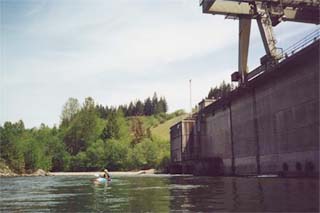
Sultan Access Restored (WA)
This week the City of Everett and Snohomish PUD announced that the Allen Gate, which controls
access to Lake Chaplain Road will once again be opened on weekends from the hours of 6 am to 6
pm, starting this Memorial Day weekend. This gate has been closed on weekends since fall 2001
preventing the public from accessing designated recreation sites and important river access along
the west side of the Sultan
River, including areas used by kayakers, birders, bikers, fishermen, and the general public.
In particular the restricted gate hours had effectively eliminated the most important river
access to the Lower Sultan at the Powerhouse and the Horseshoe Bend section located below the old
diversion dam, for all but a small minority of recreational users who had the opportunity to
access the river during the work day.
The Snohomish PUD has asked the paddling community to return to the access point on river right
for those running the river below the powerhouse (over the past two years the only possible
access on weekends when demand was highest was from river left at the powerhouse). In addition we
now once again have walk-in access to the Horseshoe Bend run on weekends which can be reached by
walking up the gated road that leads up to the old diversion dam. The Snohomish PUD has been very
helpful in developing interim solutions to address access needs and working with the recreation
community to address longer term issues.
It's important to note that this access will be closed if the Homeland Security threat level is
raised to orange or red.
Background:
American Whitewater identified denial of public access to rivers on security grounds as a Top Ten
Issue in 2002, and this represents one more success in restoring important public access. Our
goal was to work with security personnel at dams and river management agencies to address
security needs while protecting the public's river use and access traditions for boaters,
fishermen, and the general public. In June 2002 the Washington Post quoted Assistant Attorney
General Michael Chertoff, when he affirmed that "to destroy a dam physically would require 'tons'
of explosives'". Such a volume of explosives is far in excess of the volume or carrying capacity
of a whitewater canoe, kayak, or fishing bag. Despite this, utilities across the country have
been incredibly inconsistent in their responses to new security issues that have been implemented
to address both the safety of public water supplies and protection of hydropower
infrastructure.
At the local level Andy Bridge and Tom O'Keefe along with other local volunteers have been
working to review the situation on the Sultan River and communicate our concerns to local staff
with the City of Everett and Snohomish PUD. In March 2002 Western Access and Conservation
Director John Gangemi participated in a site visit and he has continued to coordinate our efforts
in a national policy context.
At the national level, AW has been working closely with FERC and other members of the Hydropower
Reform Coalition to clarify procedures for implementing security changes that impact recreational
access. We have recognized the concern regarding public safety, but also feel that we can strike
a balance that allows continued access to public lands while maintaining security. It is possible
to provide security while also protecting existing public access, privileges, traditions, and
freedoms.
FERC has made it clear that security issues are not an excuse for eliminating access/recreation
and they have cautioned licensees against doing this. In the FERC Security Program for Hydropower
Projects, the FERC staff are directed to review how upgraded security elements impact license
articles, especially relating to environmental concerns and recreation. The document further
states that, "Any closures of facilities, such as for recreational areas or roads, exceeding 30
days may need to proceed through the license amendment process", and that "Permanent closure of
license-required facilities should not be allowed without license amendment". While access to the
Sultan River was never technically eliminated, because access was available on weekdays, the
restrictictions did effectively limit recreational access. Access to recreation sites (site 3 on
river right at the powerhouse and site 5 providing access to the Horseshoe Bend run), as
identified in the Recreation Plan for the Henry M. Jackson Hydroelectric Project (FERC Article
52, Exhibit R, 20APR1991) were restricted for more than 2 years. We appreciate the efforts of
Snohomish PUD and the City of Everett in developing a security plan that restores this important
public access to weekend use.
